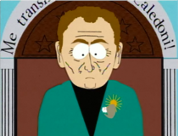(By convention I capitalize the name of the Christian God, but use 'god' to refer to a nonspecific deity.)
I was born and raised Roman Catholic. I've received the sacraments of baptism, communion, penance and confirmation.
I first started questioning religion around the age of 11. The first manifestation was in fighting to have my Sunday mornings free. I didn't get very far with that.
My doubts progressed until age 17, when I decided that the bases for Christianity (original sin, etc.) were literally incredible, and I decided I no longer subscribed. Being a high school senior living at home, I was not ready to rebel against my parents, so I went through the motions for show.
At age 18, while off at college, I decided that the concept of a supernatural creator-of-the-universe was unsupportable by any evidence I was aware of. I decided to make a pact with myself: I would spend the next year watching for any indication that the world was not as it would be if there were no supernatural beings affecting anything.
When I returned home for the summer after my Freshman year, I announced to my mother that I would not be attending Mass with her any more. She threatened to evict me from my childhood home. I called her bluff. She did not follow through. Win!
At age 19, I declared my experiment to be over. My conclusion, to borrow from Julia Sweeney: "Oh my God! There is no God!" I decided to continue to watch for contradictory evidence, but my working theory would be there are no gods, no afterlife, nothing but the natural world. What you see is what you get. I've seen nothing in the last 25 years that has contradicted this worldview.
Shortly thereafter, I received a survey in the mail that used the word "atheist." When I looked up the word in the dictionary, I discovered that this label fit me. I proceeded to the campus library to learn more of atheism.
Somewhere around this time I went through a period of grief. I learned that this is normal for people who lose their belief in life after death.
I've often wondered why I developed the ability or willingness to examine supernatural claims with the same critical eye that I would use for learning about the natural world, when most people just compartmentalize the supernatural as something to be kept separate, not to be questioned. I've never come up with any satisfactory explanations.
I don't have any traumatic experiences that I can establish as a trigger. My deconversion was the result of gradual self-exploration.
Update
Reader Sally said she attempted to comment on this post (see Technical Difficulties above), then posted the comment elsewhere. I am going to take this as implicit permission to share her comment here in her stead:
Arium(aka Joe),
I have read your “deconversion” story as well as your other posts and the comments left by readers. Thank you for posting it in response to my request elsewhere. All I feel moved to say is that I am not impressed by it. I have heard it before, from many others in many places and in many variations. So you couldn’t find “proof”? As I have come to understand it, we have no right to expect anything more from God than we have already been given: our lives, the planet, the universe, one another. We did not create all of this reality and its benefits to us. That is miracle enough to impress me and inspire my awe.
If anyone has a right to expectations it’s God, who has the right to expect us to behave properly and to use all that God has given to us with respect, humility, and gratitude.
There are plenty of books and blogs out there by former atheists who have arrived at the other end of your road and finally understood–intellectually and emotionally–what they were missing. Now these are stories that impress me! And teach me and move my heart. You, my dear, seem stuck in adolescence.
Of course there are plenty of Christians out there who need to have a lot more humility about their faith and a lot more compassion for those who can’t believe. After 20 years away from the Church, I now treasure the faith I have and I don’t take it for granted, because it has saved my life, which I now live in the hope that it will be used to help save the lives of others. I pray that one day you will be able to accept that gift as well.
Peace be with you,
Sally
Sally, I have no doubt that you "have heard it before," just as I have heard many variations on "religion requires faith" in my lifetime. Such is the nature of the irreconcilable differences in our worldviews.
I too have come across examples of former atheists turned Christian. Of the few who I have listened to closely, I've been left with the impression that they were predisposed to religious belief, and it was just a fluke that they had been nonbelievers at one time. The first public example that comes to mind is Marvin Olasky, who, to my recollection, coined the term "Compassionate Conservatism." (Wikipedia disagrees.)
In my mind I am most assuredly not "stuck in adolescence." Adolescence was a time in which I dealt with conflicting issues of seeming to have received more than my fair share of libido, and having been taught that I would go to Hell for masturbating. I am very happy to have gotten past that time in my life. (I considered this as a possible explanation for why I was able to escape the bonds of religion, as I discussed above, but I figure that I couldn't have been completely convinced that I was going to Hell, or I would not have experienced the period of grief I described.)


No comments:
Post a Comment